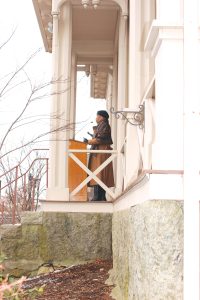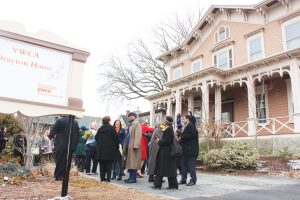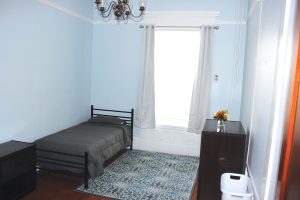 The organization is already hard at work on a fourth home that will address the city’s housing crisis.
The organization is already hard at work on a fourth home that will address the city’s housing crisis.
The YWCA of Southeastern Massachusetts opened its third residential program in January to support and serve the growing need for affordable housing for women.
More than 100 people gathered at 549 County St. in New Bedford to applaud and cheer for the newly opened home, formerly known as Elizabeth’s House, that will provide housing for 12 women.
In her remarks, YWCA Executive Director Gail Fortes said the YWCA purchased the building in February of 2023, intentionally choosing to modify an existing building in the city rather than build a new one.
The opening of the program increases the YWCA’s housing by 40 percent bringing the total number of women served to 27, she said.
“We are experiencing a housing crisis and a shortage in our community,” Fortes said at the Jan. 31 ribbon cutting event. “On a daily basis at the YWCA, we receive walk-ins, people calling, emails, (from) people who are really desperate and in need of affordable housing.”
“With rents skyrocketing, we’re also seeing a population of people who never needed assistance before, our seniors, a lot of people with disabilities, and working people who do not qualify for public services,” she continued. “Some are being displaced, with … new landlords raising their rents almost double.”
The Drayton House is the YWCA’s third residential program with another one already in the works, according to Fortes, who stressed the negative impact of the current affordable housing shortage on the community.
 “This is unacceptable for our community,” she said. “We need to raise our voices and continue to advocate and not only ask, but demand, that our city, state and federal officials work and commit to ensuring that residents in New Bedford and everywhere have equal access to affordable, clean, safe and well-maintained quality housing that meets their needs in a place that they can call their home.”
“This is unacceptable for our community,” she said. “We need to raise our voices and continue to advocate and not only ask, but demand, that our city, state and federal officials work and commit to ensuring that residents in New Bedford and everywhere have equal access to affordable, clean, safe and well-maintained quality housing that meets their needs in a place that they can call their home.”
It was fitting for many reasons that the new home is named for longtime community leader and former YWCA Executive Director Yvonne Drayton who led the YWCA in exploring residential programs, expanding its capacity and service area, and mentoring and empowering a new generation of leaders. Drayton, who retired as YWCA executive director in 2007 was the obvious choice, speakers said.
Drayton has also played a strong role at the national level for the YWCA association, was a co-founder of the Homeless Service Provider Network in New Bedford, and continues to serve in the community.
“As we were discussing names for this program, we wanted to name it after someone who lives and breathes the YWCA mission,” said Fortes.
“Within about five seconds, we all came to the same conclusion and that person was Yvonne Drayton.”
In her remarks, YWCA board president Lindsay Carter-Monteiro called Drayton a champion for equitable opportunities for everyone. The YWCA was “intentional and thoughtful” in its strategic plan and what they wanted the housing project to embody for residents, she said.
Carter-Monteiro also thanked Drayton for being a personal mentor to her.
“Even in the 90s I had never worked for a woman of color especially one that was in a position of leadership let alone the executive director,” she said. “I can remember being captivated by the way she could command a room with her presence when she visited the site…With her support and her reassurance … I found my voice that gave me the confidence to stand here today as your board president.”
In her remarks, Drayton recalled being 13 years old and going to the YWCA on Spring Street to sign up for tennis lessons. Looking out over the crowd, she called it heartwarming to see so many people present who have contributed to and supported the YWCA over the years.
“One of my fondest memories is being hired from the board of directors by Bettina Borders, who said, ‘You need to think about this as either saving the YW or closing it.’ And I went home and I told my mother and my aunt that that’s what she said and they said, ‘Well you can’t close it on your watch.’ So I said, ‘OK, let me work,’” she said.
Drayton said it’s always been easier to house men than it has women. She appealed to those present to continue to support the YWCA and these types of programs through direct work, financial contributions or voting.
“The need is great,” she said.
The women who are served through the YWCA’s residential programs are often homeless after leaving another program, priced out of a current living situation, or couch surfing, according to Fortes.
The YWCA does more than provide a roof over their heads.
“We are committed to giving them a furnished place to live that they can call their own,” Fortes said. “Many of our residents say this is a natural home for us. It is not a facility. It is not a dormitory. And for the first time I have a key to my own place

Recent Comments